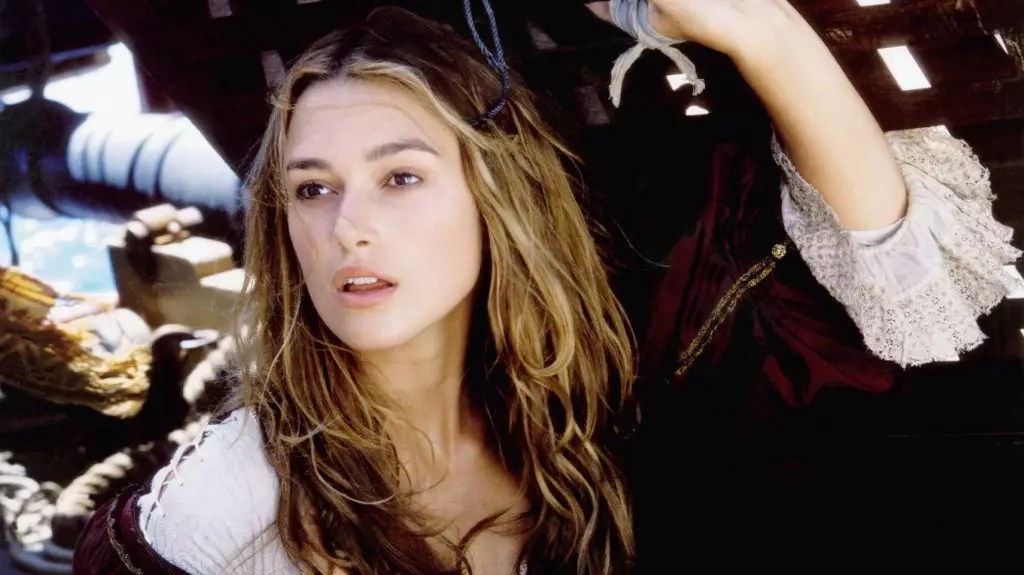Keira Knightley’s entry into the cinematic world at a tender age of seventeen, particularly through her role in the now-iconic “Pirates of the Caribbean” franchise, marked a significant turning point in her life. From the very beginning, she was thrust into an arena where fame clashed with personal vulnerabilities. As she candidly discussed in a recent profile with The Times of London, Knightley expressed her ambivalence towards her early works, highlighting the paradox of being molded by both their success and the public scrutiny that followed. The films that catapulted her into stardom also subjected her to a critical gaze, which, in her words, was both “making” and “breaking.”
The observations Knightley makes about her experiences are reflective of a broader phenomenon in Hollywood, where young actors often find themselves subjected to intense public scrutiny. The dichotomy of being celebrated for talent while simultaneously facing the unrelenting pressures of fame is a challenge that many such individuals grapple with. For Knightley, the role of Elizabeth Swann not only enhanced her career but also left her grappling with the personal costs associated with constant assessment by the media and public.
The Challenge of Control
Knightley’s reflections extend to the demanding nature of franchise filmmaking—particularly the rigorous schedules and the lack of creative control that often accompanies such projects. Her decision to step away from pursuing similar roles encapsulates her desire for autonomy as an artist. “The hours are insane. It’s years of your life,” she remarked, shedding light on the sacrifices required in the pursuit of big-budget productions. This raises an important discussion about the expectations placed on actors within the industry, especially those who have enjoyed significant success. Knightley’s choice to prioritize her own well-being and that of her family over the allure of blockbuster franchises is a testament to her growth and self-awareness.
In today’s entertainment landscape, where streaming services and new forms of storytelling are revolutionizing filmmakers’ and actors’ creative freedoms, Knightley’s decision serves as a poignant reminder. It addresses the ongoing conversation about self-care in an industry notorious for demanding commitment at the cost of personal lives.
Knightley’s narrative reveals the trauma and challenges she faced as a young woman navigating Hollywood’s treacherous waters. She recalls speculations regarding her mental health and body image, emphasizing the need for sensitivity around discussions of women’s health in the entertainment sector. Her candidness regarding her experiences speaks volumes about the societal pressures women face, particularly in an era that historically failed to address issues such as mental health with the seriousness they deserve.
The impact of public shaming and speculation can be damaging. Knightley’s feelings of being publicly scrutinized and shamed have not only shaped her professional choices but also her psyche. This is particularly striking in light of the considerable media attention surrounding celebrities’ personal lives, often overshadowing their professional accomplishments.
Despite the challenges Knightley has faced, she continues to forge ahead in her career with resilience. Her upcoming role in Netflix’s “Black Doves” alongside Ben Whishaw signals a new chapter. Notably, this project aligns with her desire for creative fulfillment rather than merely participating in franchises that might exploit her fame.
Moreover, Knightley’s emphasis on family and personal life, especially after becoming a mother, illustrates a shift in her priorities. She mentions taking time off to raise her daughters, showcasing how personal fulfillment can reshape one’s professional path. This aspect of her life refreshingly contrasts the relentless pursuit of success that’s often glorified in Hollywood.
Keira Knightley’s journey illustrates the complexities of navigating fame, mental health, and personal identity. Her story serves as a powerful reminder of the need for compassion and understanding in the entertainment industry as it grapples with its evolving societal roles. Knightley’s experiences and insights offer an invitation for reflection not only for fellow actors but for audiences and industry leaders alike, fostering a culture that prioritizes well-being over mere stardom.


Leave a Reply